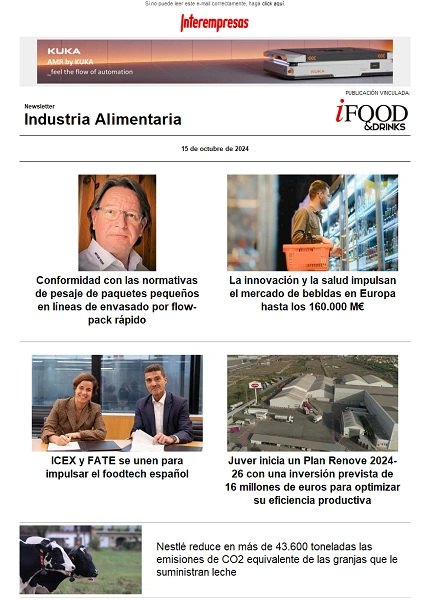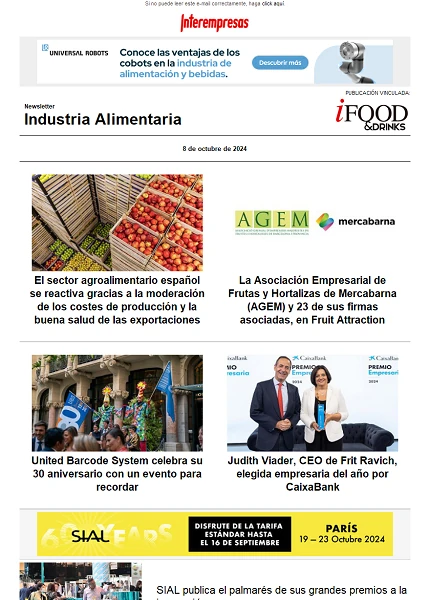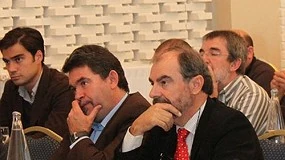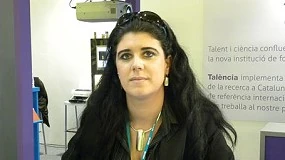Interview with Elena Espinosa, Minister of environment, Rural and marine
January 22, 2010
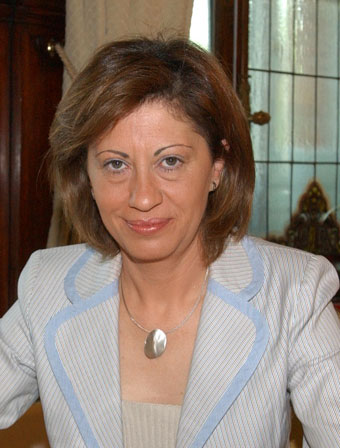
Spanish farmers took to the streets in recent weeks to demand a solution to what they considered an untenable situation for them. Claims read by farmers after the demonstration and presented at multiple meetings with you, what does that "easier" the Executive may compromise a step forward in the coming months?
The Government, aware of the difficulty of the agricultural sector, which is not unrelated to the general crisis, has been maintaining, in recent weeks, various meetings with representatives of agricultural organisations and agri-food cooperatives and has pledged to implement an emergency plan to deal with the crisis of profitability that goes through the sector agrarian. Some measures are already underway, though probably not have reached clearly public opinion. As a result of this commitment of the Government, already has been formed, for example, table on financing of the agricultural sector, to address the current financial situation of the sector, analyzing the different instruments and measures available to facilitate access to funding. Studied measures focus on the establishment of a moratorium of one year in loans to the modernization of farms, the incorporation of young farmers or farming partners. The cost generated by the increase of interest will be assumed by the Ministry but we hope that the autonomous communities can be involved in this commitment. Other proposals which we consider are aimed at the implementation in the agricultural sector of the new line of liquidity of the ICO, the realization of a new agreement with Saeca to subsidise guarantees to credits and ultimately continue to subsidize the interests of those loans of the ICO lines included in the stimulus Plan investment in the Sector Agrarian.
In relation to the stimulus of demand is underway on enhancing and improving existing lines that favor exports of agri-food sector, as well as the opening of international markets through negotiations aimed at preventing obstacles to trade. In this sense, the sectoral table of food promotion also met to study additional performances or reinforce and optimize existing ones, to foster demand for agri-food products. In the context of a difficult economic situation as the current is essential, also, the sector provide sufficient guarantees in its exporting activity, who now takes greater risks, and which can provide greater assurances, in order to avoid the loss of markets in which it has been difficult to position themselves and whose building is priority.
With regard to taxation, the sector will have a professional diesel fuel, which will be normatively recognized in the future law of sustainable economy as of January 1, 2010. On the other hand, is now a reality which rises VAT compensation in agriculture and animal husbandry, at a historic request of the sector in the General budgets of the State of this year...
I would like to highlight one of the objectives of the Spanish Presidency of the EU during the first half of 2010, is to defend the maintenance of a cap sufficiently endowed in the horizon of 2020 and the recognition of agriculture and food as a strategic sectorquestions they addressed in the meetings to the field in the table on the future of the CAP. The debate on the need for measures to manage markets to cope with the increasing volatility of international agricultural prices, as well as a general reflection on the model of CAP in the 2020 horizon be taken with our community partners for this reasonwith a sufficient budget and a few instruments commensurate with the challenges facing the food and agriculture as strategic sectors for the entire EU.
The President of the Government has a clear commitment to the agri-food sector, which will materialize in a meeting with representatives of agricultural organisations and agri-food cooperatives to evaluate the development of measures of the shock Plan that we have made.
The free market goes against the fact that the farmer and the farmer to receive a fair price for what that is? What fault do in this situation the larger publishers?
One of the sectors that has suffered most the situation, both by the price war, as the expectations of the release of the market as from 2015, it is the milk. What message is you can launch the farmers that threatened their business after strong investments have been made in recent years?
The facts that we have experienced recently should serve us to realize that the future context in which will be producing activity, will be governed by new constraints that they will make the volatility of the markets in the medium term a constant. For this reason, the recent crisis in the dairy sector, whose effects we are beginning to recover, should serve to reflect the future and guide our efforts to seek us tools and media to be prepared in similar circumstances. The message would be along these lines, to convey the idea of the importance that will take the concept of competitiveness of agricultural production and the need to preserve it as a basic objective of the policies that are developed in the very near future. For this purpose and the guarantee instruments of market act as a guarantee of income and as a safety net in situations that require it, is that Spain is going to work hard, taking advantage of also the current period of Presidency of the EU that is up to us.
In the primary sector European policies play a key role. Being discussed cap beyond 2013, a date which many farmers see with fear. What points of the amendments to the distribution of resources proposed by Brussels against the Spanish Government?
First of all be noted that the budget for the CAP is consolidated until 2013 and that there is still no firm proposals by the EC, on the amendment of the Community budget and the common policies. The process of revision of the Community budget responds to the mandate of the European Council of December 2005, which, with the adoption of the current financial perspective, invited the Commission to undertake a complete review of all the components of expenditure and revenue of the Community budget, with reference to the common agricultural policy among the first and the "rebate" specified between the seconds, and then submit a report thereon.
The Commission, about to complete the mandate given by the Council, prepared a draft of unofficial communication, 'Agenda reformed for a global Europe - reforming the budget, changing Europe', which was unacceptable to the CAP treatment, because there virtually the only specific objective that was defined for this Community policy was the liberalisation of power resources implement them in other Community policies. This leaked document, which did not have the support of the College of Commissioners, was eventually disqualified by President Barroso, which indicated that it would be the next Commission to which this communication process during the year 2010.
Recently, the Commission has introduced a new 'consultation document on the future EU 2020 strategy ', which aims to be a document of ideas and reflection to bring the guidelines for the actions of future in the 'Horizon 2020'. Spain will contribute to this debate, which should incorporate agriculture and the CAP between the challenges of the EU's future. The guidelines of this document, once endorsed by the spring European Council, which the guidelines of the document on the revision of the Community budget that could arise later, as well as his proposals for the next financial perspective. In this process we want to highlight the importance of having a strong cap and sufficient financial instruments to meet the future challenges of the agriculture and the production sector European and Spanish.
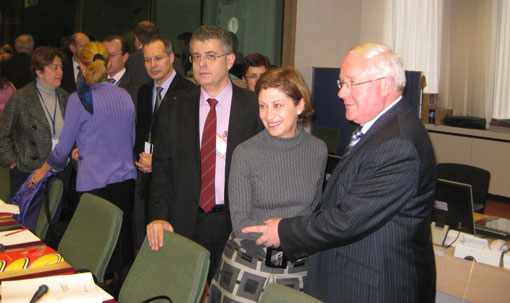
Animal health has also been a strong point of its policy. What steps are occurring so that there is increased vigilance in an increasingly globalised market? It requires the same conditions to the products of Spanish farmers than what we import?
In relation to the issue of the increased monitoring in a situation of more open markets, I would like to emphasize that in 2008 the Council of the EU reviewed the conditions in which we import products from third countriesconcluding that there is a need for the services of the European Commission to prepare a detailed report on the situation that includes proposals to act accordingly.
It should be noted that health and animal welfare are important factors, that should be controlled to ensure the quality and safety of food, to prevent the spread of animal diseases and to prevent the transmission to humans.
Member States must ensure that compliance with the legislation on animal welfare, health, food and feed, and responsible companies to meet standards at all stages of the production, processing and distribution, because each stage has the potential to affect the food security, in the final stage of marketing.
The current legal framework aims at measures apply in the same way in all Member States and that the products imported from third countries comply with conditions at least equivalent to those required in the EU. Lists of countries that have shown the proper functioning of their systems of control in the production, with a security comparable to that required in the EC are developed to achieve this goal. To develop these lists there are experts from the European Commission carried out the necessary official controls in third countries.
Is of great importance also, point out the creation of a rapid alert system for food and feed (RASFF) in the form of network, intended to notify the direct risks or indirect, to human health deriving from food or feedwith information both for all EEMM and for third countries. This ensures that a consignment of food or feed which has been rejected in border, by be considered risk, is not introduced by another Member State. In recent years there has been a notable increase in the number of veterinarians responsible for animal health in border controls, to verify that the animals and the products which fall within the territory of the EU comply with established standards and are introduced by the corresponding border inspection priority.
Many experts that deal with agriculture and animal husbandry from universities and companies reported that the Spanish role in the r & d remains poor. What you need to make a leap forward in aspects as the study of the treatment of the plants, livestock, etc.?
Regardless of the time in question, when we speak of technology always has the feeling that it is not doing enough in every moment. However, in recent years I have seen that there has been substantial progress in this field. Firstly, with regard to the degree of awareness and involvement of Governments, the business sector, farmers and ranchers and other professionals in the field, who have managed all they recognize the importance of organizing and involvement to share experiencesto study the needs, prioritize actions and finally transfer the results of the research. Thus, at European level we have witnessed significant events as the creation of the technological platform for global animal health (ETPGHA), and plant health has established a Community framework for coordination of research (Euphresco) responsible for proposing lines of research in this area. At the national level, these initiatives have also been reflected, as the recent establishment of the Spanish technological platform for Animal Health (Vet+i).
Secondly, we must be aware that is not usual in agricultural research breakthroughs that mark a before and an then, to the use of what is happening in other disciplines such as medicine, physics or telecommunications. However, progress is continuing and, without wanting to be exhaustive, I would highlight the innovations in the treatment of pest, in the diagnosis more reliable and faster of pests and diseases, to prevent them, and here would remember that precisely Spanish laboratories have been the precursors of the vaccine inactivated against Bluetongue; but it also highlight developments in the field of the sustainability of agricultural and livestock productions, improving aspects such as the level of emission of pollutants or rationalization in the use of resources and means of production.

